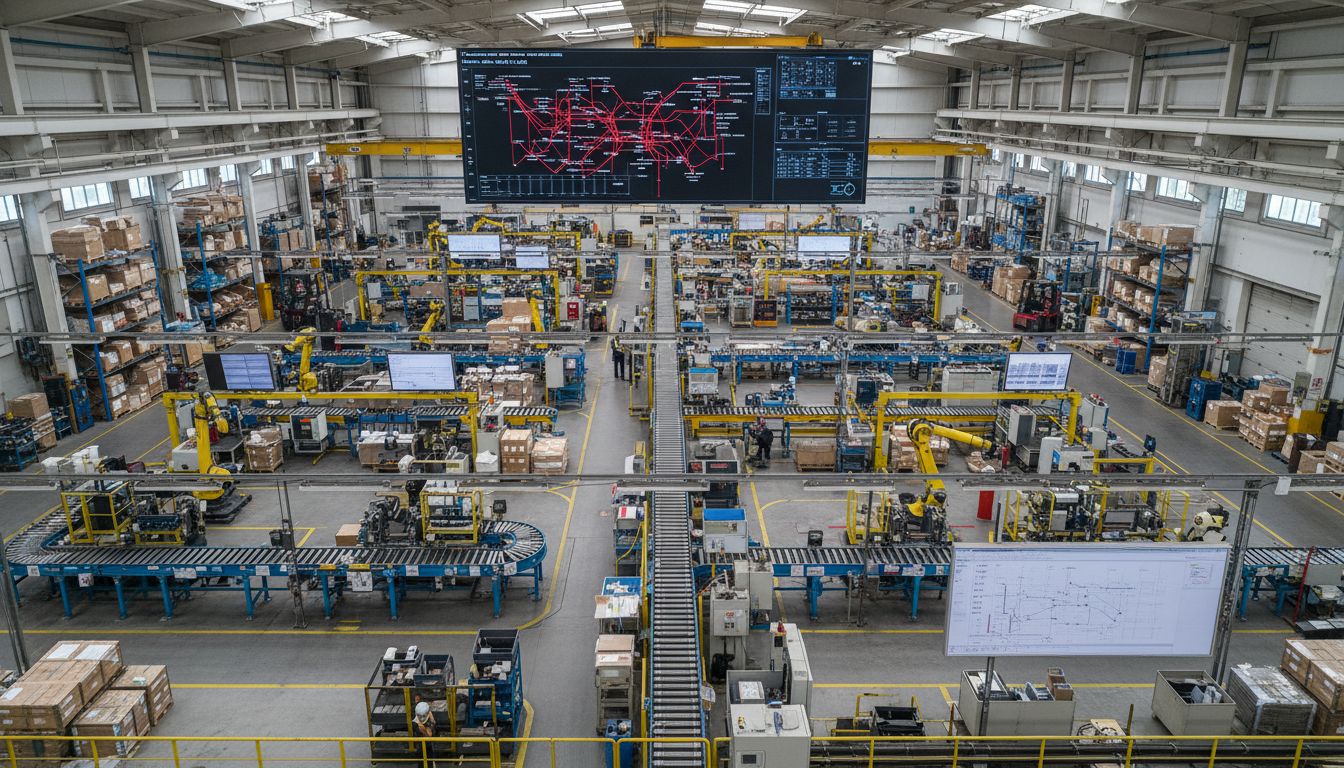7 Practical Examples of AI in SMBs You Can Implement

AI is changing how small and medium businesses get things done, from answering customer questions to streamlining daily tasks. You might think only big companies can afford this kind of tech. Yet more than 37% of Americans have already interacted with chatbots and SMBs are quietly using powerful AI tools to serve customers better, sell smarter, and even predict the future of their business.
Table of Contents
- Automating Customer Service With AI Chatbots
- Using AI For Personalized Marketing Campaigns
- Implementing AI-Powered Inventory Management
- Enhancing Data Analysis With AI Tools
- Streamlining HR Processes With AI Solutions
- Integrating AI In Financial Forecasting
- Improving Sales Strategies With AI Insights
Quick Summary
| Takeaway | Explanation |
|---|---|
| Implement AI chatbots for 24/7 support | AI chatbots provide instant, round-the-clock customer service at lower operational costs. |
| Leverage AI for personalized marketing | Use AI tools to create hyper-personalized campaigns that engage customers more effectively. |
| Adopt AI-driven inventory management | Utilize AI to optimize stock levels, reduce waste, and improve forecasting accuracy. |
| Enhance data analysis with AI tools | AI analytics can transform complex datasets into actionable insights for better decision-making. |
| Utilize AI for predictive sales strategies | AI insights help anticipate customer behavior, improving engagement and conversion rates. |
1: Automating Customer Service with AI Chatbots
Small and medium businesses face constant pressure to deliver exceptional customer service while managing operational costs. AI chatbots represent a strategic solution that transforms how companies interact with customers, providing round the clock support without significant personnel investments.
Traditional customer service models require substantial human resources, but AI chatbots change this dynamic completely. Research from Harvard Business School reveals that AI-assisted customer service agents respond 22% faster, with less experienced team members improving response times by an impressive 70%.
Implementing AI chatbots offers several critical advantages for SMBs:
- 24/7 Customer Support: Instant responses regardless of business hours
- Cost Reduction: Minimize customer service staffing expenses
- Consistent Service Quality: Eliminate human error and emotional variability
The most effective AI chatbots go beyond simple scripted responses. They leverage natural language processing to understand context, provide personalized interactions, and seamlessly route complex inquiries to human representatives. This approach ensures customers receive accurate, helpful information while maintaining a human touch.
For business owners considering AI chatbot integration, strategic implementation is key. Start by identifying repetitive customer inquiries that consume significant staff time. These might include basic product information, order tracking, or standard troubleshooting questions. By automating these interactions, your team can focus on more complex, high value customer needs.
According to the Consumer Financial Protection Bureau, approximately 37% of the U.S. population now interacts with chatbots in various service contexts. This statistic underscores the growing acceptance and expectation of AI driven customer service solutions.
Remember that successful AI chatbot deployment isn’t about replacing human interaction but enhancing it. The goal is to create a seamless, efficient customer experience that builds trust and satisfaction while optimizing your team’s productivity.
2: Using AI for Personalized Marketing Campaigns
Personalization has become the cornerstone of effective marketing strategies, and artificial intelligence offers small and medium businesses unprecedented capabilities to create targeted, compelling campaigns that resonate with individual customers.
Traditional marketing approaches often rely on broad demographic segmentation, but AI enables hyper personalized marketing that considers individual customer behaviors, preferences, and potential future actions. This approach transforms how businesses connect with their audience, moving beyond generic messaging to truly individualized experiences.
Research from McKinsey indicates that companies implementing AI driven personalization can see marketing spend efficiency increase by up to 30% while generating significant improvements in customer engagement and conversion rates.
Key strategic approaches for AI powered marketing personalization include:
- Predictive Customer Behavior Analysis: Anticipate customer needs before they arise
- Dynamic Content Generation: Create real time marketing materials tailored to individual preferences
- Intelligent Customer Segmentation: Move beyond traditional demographic groupings
AI marketing tools can analyze vast amounts of customer data to identify nuanced patterns that human analysts might miss. This includes examining purchasing history, browsing behavior, social media interactions, and even sentiment analysis to craft messages that feel uniquely crafted for each recipient.
For small business owners, the most powerful application of AI in marketing involves intelligent recommendation systems. These sophisticated algorithms can suggest products, services, or content that align precisely with a customer’s demonstrated interests and past behaviors.
Implementing AI marketing solutions doesn’t require massive technological infrastructure. Many modern marketing platforms offer integrated AI tools that can be deployed quickly and scaled according to business needs. The key is selecting solutions that integrate seamlessly with existing customer relationship management systems and provide clear, actionable insights.
Business leaders should view AI marketing not as a replacement for human creativity, but as a powerful augmentation tool that amplifies marketing team capabilities. By combining machine learning insights with human strategic thinking, businesses can create marketing campaigns that are both scientifically precise and emotionally compelling.
3: Implementing AI-Powered Inventory Management
Inventory management represents a critical challenge for small and medium businesses, where inefficient stock control can dramatically impact profitability and operational efficiency. Artificial intelligence offers transformative solutions that go far beyond traditional inventory tracking methods.
AI powered inventory systems revolutionize how businesses predict, manage, and optimize their stock levels. These intelligent systems analyze multiple data points simultaneously, including historical sales data, seasonal trends, market fluctuations, and external economic indicators to generate precise demand forecasts.
Research published in Computers in Industry demonstrates that AI implementation can lead to more accurate demand prediction, lower inventory holding costs, and greater responsiveness to supply chain disruptions.
Key advantages of AI driven inventory management include:
- Real Time Tracking: Instantaneous inventory updates across multiple locations
- Predictive Restocking: Automated purchase recommendations based on complex algorithms
- Waste Reduction: Minimizing overstock and understock scenarios
Small businesses can leverage AI inventory tools to make data driven decisions that were previously accessible only to large enterprises. These systems continuously learn and adapt, providing increasingly refined recommendations as more data becomes available.
The most sophisticated AI inventory management solutions integrate seamlessly with existing enterprise resource planning systems. They can automatically generate purchase orders, predict potential supply chain disruptions, and even suggest optimal pricing strategies based on current stock levels and market conditions.
Business owners should approach AI inventory implementation strategically. Start by identifying specific pain points in current inventory management processes. Look for solutions that offer flexible integration, user friendly interfaces, and scalable functionality.
While the technology might seem complex, modern AI inventory tools are designed with small business users in mind. They provide intuitive dashboards that transform complex data into clear, actionable insights. The goal is not to replace human decision making but to provide business leaders with unprecedented visibility and predictive capabilities.
By embracing AI powered inventory management, small and medium businesses can achieve a competitive edge through more efficient operations, reduced costs, and improved customer satisfaction.
4: Enhancing Data Analysis with AI Tools
Data analysis represents a critical function for small and medium businesses seeking to make informed strategic decisions. AI tools have transformed this landscape, enabling companies to extract meaningful insights from complex datasets with unprecedented speed and accuracy.
Traditional data analysis methods often require significant time and expertise, creating barriers for businesses with limited resources. AI powered analytics platforms democratize this process, providing sophisticated analytical capabilities that were previously accessible only to large corporations with extensive technical teams.
Research from the Robert H. Smith School of Business highlights the transformative potential of AI tools in helping small businesses leverage data more effectively, turning raw information into actionable strategic insights.
Key advantages of AI driven data analysis include:
- Rapid Processing: Analyze thousands of data points in seconds
- Pattern Recognition: Identify complex trends humans might miss
- Predictive Modeling: Generate forward looking business scenarios
AI data analysis tools can integrate multiple data sources seamlessly, from financial records and customer interactions to market trends and operational metrics. These platforms use machine learning algorithms to continuously refine their analytical capabilities, providing increasingly nuanced insights over time.
For small business owners, the most powerful AI data analysis tools offer intuitive dashboards that translate complex statistical information into clear, actionable visualizations. This means even team members without advanced technical training can understand and leverage sophisticated analytical insights.
Implementing AI data analysis requires a strategic approach. Business leaders should start by identifying specific analytical challenges they want to address. This might include understanding customer behavior patterns, optimizing pricing strategies, or predicting potential market shifts.
The most effective AI data analysis solutions are those that balance technological sophistication with user friendliness. Look for tools that offer seamless integration with existing business systems, robust security protocols, and flexible reporting capabilities.
Ultimately, AI data analysis is not about replacing human judgment but augmenting decision making capabilities. By providing deeper, faster, and more comprehensive insights, these tools empower business leaders to make more informed strategic choices with greater confidence.
5: Streamlining HR Processes with AI Solutions
Human resources management represents a complex landscape of administrative tasks, talent acquisition, and employee engagement. Artificial intelligence offers small and medium businesses powerful tools to transform traditional HR approaches, making processes more efficient, data driven, and strategically focused.
AI powered HR solutions go far beyond simple automation. These intelligent systems can analyze candidate profiles, predict employee performance, manage recruitment workflows, and provide personalized employee development recommendations with unprecedented precision.
The Society for Human Resource Management highlights the transformative potential of AI in creating more responsive, intelligent HR service delivery models that reduce administrative overhead and enhance employee experiences.
Key strategic advantages of AI in HR include:
- Intelligent Candidate Screening: Identify top talent faster and more objectively
- Predictive Workforce Analytics: Anticipate staffing needs and potential turnover risks
- Automated Onboarding Processes: Create personalized employee integration experiences
Small businesses can leverage AI HR tools to level the playing field with larger competitors. These solutions enable more sophisticated talent management strategies without requiring extensive HR departments or massive technological investments.
The most advanced AI HR platforms use machine learning algorithms to continuously refine their understanding of workforce dynamics. They can analyze historical performance data, identify skill gaps, and even recommend targeted training programs tailored to individual employee development needs.
Implementing AI HR solutions requires a thoughtful approach. Business leaders should prioritize tools that offer seamless integration with existing systems, robust data privacy protections, and intuitive user interfaces that reduce technological barriers for HR teams.
While AI can dramatically enhance HR processes, human oversight remains critical. These tools should be viewed as intelligent assistants that augment human decision making, not replace the nuanced judgment of experienced HR professionals.
By embracing AI powered HR solutions, small and medium businesses can transform HR from a purely administrative function into a strategic partner driving organizational growth and employee satisfaction.
6: Integrating AI in Financial Forecasting
Financial forecasting represents a critical function for small and medium businesses, where accurate predictions can mean the difference between strategic growth and potential financial instability. Artificial intelligence has emerged as a transformative tool, enabling businesses to generate more precise, nuanced financial projections with unprecedented depth and reliability.
Traditional financial forecasting methods often rely on historical data and linear extrapolation, which can miss complex market dynamics. AI powered financial forecasting introduces sophisticated machine learning algorithms that can analyze multiple data streams simultaneously, identifying subtle patterns and potential future scenarios that human analysts might overlook.
Research from Johns Hopkins University highlights the growing importance of AI in financial planning, demonstrating how intelligent systems can transform raw financial data into actionable strategic insights.
Key advantages of AI driven financial forecasting include:
- Multi Variable Analysis: Simultaneously process complex economic indicators
- Real Time Adjustment: Dynamically update forecasts based on emerging data
- Scenario Simulation: Generate multiple potential financial outcomes
Small business owners can leverage AI financial tools to move beyond traditional spreadsheet models. These intelligent systems can integrate external economic data, industry trends, seasonal variations, and company specific metrics to create holistic financial predictions.
The most advanced AI financial forecasting platforms use predictive modeling techniques that go far beyond simple trend analysis. They can simulate thousands of potential financial scenarios, providing business leaders with a comprehensive understanding of potential risks and opportunities.
Implementing AI financial forecasting requires a strategic approach. Business leaders should seek solutions that offer transparent algorithms, allowing users to understand the logic behind predictions. Look for platforms that provide clear visualizations, allowing even non technical team members to interpret complex financial projections.
While AI can dramatically enhance financial forecasting capabilities, human expertise remains crucial. These tools should be viewed as powerful assistants that provide deeper insights, not as replacements for strategic financial thinking.
By embracing AI powered financial forecasting, small and medium businesses can develop more robust, adaptive financial strategies that respond dynamically to changing market conditions.
7: Improving Sales Strategies with AI Insights
Sales strategies have dramatically transformed with the advent of artificial intelligence, providing small and medium businesses unprecedented capabilities to understand, predict, and engage potential customers with remarkable precision. AI powered sales insights go beyond traditional analytical approaches, offering dynamic, real time strategies that adapt instantly to changing market conditions.
Traditional sales methodologies often rely on intuition and historical performance data. AI driven sales strategies leverage complex machine learning algorithms that can analyze thousands of customer interaction points, generating nuanced insights that human analysts might overlook.
Research from the Association for Computing Machinery demonstrates how AI technologies are revolutionizing sales approaches for small businesses, enabling more targeted, personalized engagement strategies that significantly improve conversion rates.
Key advantages of AI powered sales insights include:
- Predictive Lead Scoring: Identify most promising potential customers
- Customer Behavior Prediction: Anticipate purchasing patterns and preferences
- Personalized Engagement Strategies: Develop tailored communication approaches
Small business sales teams can utilize AI tools to transform raw customer data into actionable intelligence. These intelligent systems analyze interaction histories, purchase behaviors, demographic information, and even subtle engagement signals to create comprehensive customer profiles.
The most sophisticated AI sales platforms offer real time recommendation engines that suggest optimal engagement strategies. These tools can determine the best communication channels, optimal contact times, and most effective messaging for individual prospects, dramatically improving sales efficiency.
Implementing AI sales insights requires a strategic approach. Business leaders should seek solutions that provide transparent, interpretable results. The goal is not to replace human sales expertise but to augment it with data driven insights that enhance strategic decision making.
AI sales tools work best when integrated holistically into existing customer relationship management systems. They should provide clear visualizations, actionable recommendations, and continuous learning capabilities that improve with each interaction.
Below is a comprehensive table summarizing the seven practical AI examples and their benefits for small and medium businesses, helping you quickly understand key solutions and outcomes discussed in this article.
| AI Application Area | Key Benefits | How SMBs Can Use It |
|---|---|---|
| Customer Service AI Chatbots | 24/7 support, reduced staffing costs, consistent service, faster response times | Automate FAQs, order tracking, and basic customer support |
| Personalized Marketing Campaigns | Improved engagement, up to 30% higher marketing efficiency, higher conversions | Tailor offers via AI-driven recommendations |
| AI-Powered Inventory Management | Accurate demand forecasts, real-time tracking, reduced waste and overstock | Automate restocking, predict trends, optimize stock |
| AI Data Analysis Tools | Rapid processing, actionable insights, pattern recognition, predictive modeling | Visualize business data and inform decisions |
| AI HR Solutions | Faster hiring, better candidate screening, workforce analytics, lower admin overhead | Automate onboarding, screen talent, predict turnover |
| AI Financial Forecasting | Dynamic scenario modeling, real-time adjustments, holistic forecasts | Simulate outcomes, spot risks, optimize strategy |
| AI Sales Insights | Predictive lead scoring, personalized outreach, behavior-based targeting | Identify top prospects, tailor engagement, boost sales |
By embracing AI powered sales strategies, small and medium businesses can level the playing field with larger competitors, transforming their approach from reactive to proactively anticipating and meeting customer needs.
Elevate Your Business with Practical AI—Guidance Beyond the Hype
You have read real examples of how AI chatbots, personalized marketing, and intelligent automation are transforming small and medium businesses. The challenge is not just knowing what is possible but knowing where to begin and how to ensure your team benefits, not just your bottom line. Many business leaders feel overwhelmed by the complexity and uncertainty of integrating new AI tools. You want automation that reduces repetitive tasks, smarter inventory management, stronger sales strategies, and data-driven decision making—without disrupting what already works.
Do not let the fear of complexity hold your business back. At Average Robot, our experts guide business owners step-by-step in blending AI into their existing models. We offer custom roadmaps, proven playbooks, and personalized support to help you enhance team morale, boost valuation, and outpace your market competition.

Ready to see practical results from AI in your business right now? Visit Average Robot and schedule a free strategy session with our AI council. Take control of your growth today and see why working with a trusted partner unlocks true value from artificial intelligence.
Frequently Asked Questions
What are some ways AI can automate customer service for SMBs?
AI chatbots can provide 24/7 customer support, handle repetitive inquiries, and offer personalized interactions, enhancing the customer experience while reducing staffing costs.
How can AI improve personalization in marketing campaigns for small businesses?
AI enables hyper-personalized marketing by analyzing individual customer behaviors and preferences, allowing businesses to craft targeted campaigns that resonate with each customer.
What are the benefits of using AI for inventory management in SMBs?
AI-powered inventory management provides real-time tracking, predictive restocking recommendations, and helps minimize waste by optimizing stock levels based on demand forecasts.
How can small businesses use AI to enhance their HR processes?
AI can streamline HR processes by automating candidate screening, predicting workforce needs, and providing personalized onboarding experiences, creating a more efficient human resources function.
Recommended
- 5 Costly Mistakes Businesses Make When Implementing AI…What Successful Business Owners Do Differently. — Average Robot
- AI and Productivity: Why SMBs Can’t Afford to Wait — Average Robot
- The SMB AI Playbook: Start Small, Scale Smart — Average Robot
- Owner-Led AI Adoption Tips for Small Businesses — Average Robot
- AI Content for SEO: Boost Rankings and Traffic in 2025




